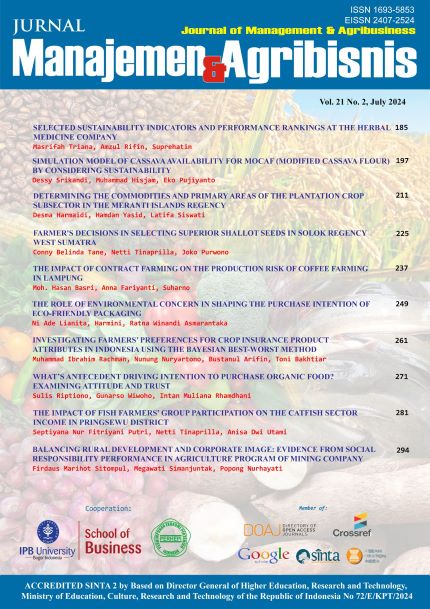The Impact of Fish Farmers’ Group Participation on The Catfish Sector Income in Pringsewu District
Abstract
Background: Challenges farmers face such as low bargaining power, difficulty accessing information regarding farming and marketing of production can be overcome if catfish farmers are active in fish farmers’ groups. Fish farming groups were formed to increase their members' farming income, through implementing fisheries businesses supported by infrastructure assistance from the Government.
Purpose: This research aims to analyze the role of fish farmers groups towards members, analyze catfish on farm income, and analyze differences in income based on participation in farming groups.
Design/methodology/approach: This study used a non-probability sampling method to sample 100 catfish farmers which is divided into 51 members and 49 non-members of the fish farming group. The method used is quantitative analysis using Endogenous Switching Regression (ESR) model analysis.
Findings/Result: The results of the research show that the fish farmers group has a sufficient role as a place for teaching and learning, a place for cooperation and production units, and the rho (ρ) value in the ESR model estimation shows that participation in farmers group has a positive impact on the income of members of catfish farming, namely that members' on farm income is greater than the income of random sample individuals and the income of non-members of the fish farmers group.
Conclusion: Role and participation in fish farming groups have a positive impact on members' on farm income, namely members' income is greater than non-members, and members' on farm income can increase.
Originality/value (State of the art): This research uses exogenous and endogenous variables which together in the ESR method can influence participation decisions in fish farming groups. Research by Mutiara et al. (2023) used a questionnaire to analyze the role of cultivation groups qualitatively, while in the research, apart from using a questionnaire with a Likert scale, empirical evidence was also carried out using the ESR model.
Keywords: Analytical Hierarchy Process, corporate sustainability indicators, sustainability practices, performance measurements, PT. Sido Muncul Tbk
Authors
Authors who publish with this journal agree to the following terms:
- Authors retain copyright and grant the journal right of first publication with the work simultaneously licensed under a Creative Commons Attribution License that allows others to share the work with an acknowledgement of the work's authorship and initial publication in this journal.
- Authors are able to enter into separate, additional contractual arrangements for the non-exclusive distribution of the journal's published version of the work (e.g., post it to an institutional repository or publish it in a book), with an acknowledgement of its initial publication in this journal.
- Authors are permitted and encouraged to post their work online (e.g., in institutional repositories or on their website) prior to and during the submission process, as it can lead to productive exchanges, as well as earlier and greater citation of published work (See The Effect of Open Access).

